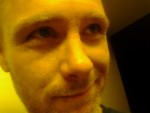Science doesn't make assumptions, it tests them
true
Side Score: 10
|
 |
false
Side Score: 10
|
|
|
|
|
1
point
1
point
|
1
point
2
points
1
point
Assumptions aren't a deal breaker for me. You don't "know" the laws of physics won't break down in the next few seconds and the universe will cease to exist. Even after you observe that the laws of physics didn't break down, how do you know you memories are not false? Perhaps your memories were of an alternate universe which you are no longer apart of. Of course these questions are absurd but they bring to light the irrationality of human thought and illusion of true knowledge. If we were perfectly rational we would not be able to make the inductive claim that since the laws of physics were one way for the past 14 billion years they will be the same for the next 14 billion years or next five seconds. We would, in fact, not be able to say that the universe even existed a second ago. Perhaps the universe started a second ago with all the evidence of the big bang and all the light from stars from billion of lightyears away already hitting the earth. Of course evolved intelligence does not have such a high standard of knowledge. All we require is the constant connection of events. If I throw a rock into the air it comes back a hits me in the face. If I play with fire I get burnt. It is not irrational to think that maybe the 1001th time I throw the rock it won't come back. Because it is useful for me to think I "know" that the rock will come back I will always assume it will come back until it doesn't. We will assume that the laws of physics are universal throughout space and time until we observe otherwise. So scientific knowledge is simply useful assumptions that have not be proven wrong by some useful standard of wrong. So to respond to the statement: "Science doesn't make assumptions, it tests them", I would say false but the assumptions it makes are the most useful ones we can make. Side: false
1
point
I disagree. How often have creationists brought up the idea that the big bang or past evolution has not been observed and is then just a theory? They seem to think that if science ever makes an assumption it is then the equivalent of faith in some invisible sky god. I am saying that this is not true. The assumptions we make should be the most useful ones, the ones that help us make the most accurate predictions of the future. The prompt is "Science doesn't make assumptions, it tests them", while science tests its assumptions the result is not truth but more useful assumptions. In fact, the tests used to test assumptions are based on assumptions which were tested by tests that were based on assumptions.... You see where I am going. At some point science has to make an assumption that everyone will agree is true. This assumption may be something like: "An measurement is a legitimate way to gather information about the state of the universe". We have to assume that the universe doesn't change when we measure it (which is not true in quantum mechanics). I suppose I may be bringing too much epistemology to a debate that was intended to provoke a creationist into saying something stupid. Side: false
this is false, science always makes assumptions that then are tested and end up beeing a theory..I really have a problem it is self evidence that science begins with assumptions,but again this is wrong by using I thing the wrong language what you mean by science doesnt make assumption , a theory starts with assumptions then tests this assumptions until they become a science paradigm. the definition given by the scientific method is well known ,any science is a science because it uses the scientific method . you can test assumptions by science ie.a method comming to be a science Side: false
Science makes assumptions all the time. The scientific method tests assumptions but those initial assumptions are made by scientists. Take Einstein for instance he assumed that nothing can travel faster than light and every other scientist for a few decades agreed with him even though they physically couldn't test it. Side: false
1
point
2
points
Assumptions assume something is truth. Hypothesis provides a possible explanation without any claim for it to be true. Some random definitions on the internet. assumption: a thing that is accepted as true or as certain to happen, without proof. hypothesis: a supposition or proposed explanation made on the basis of limited evidence as a starting point for further investigation. Obviously different. Side: true
|


